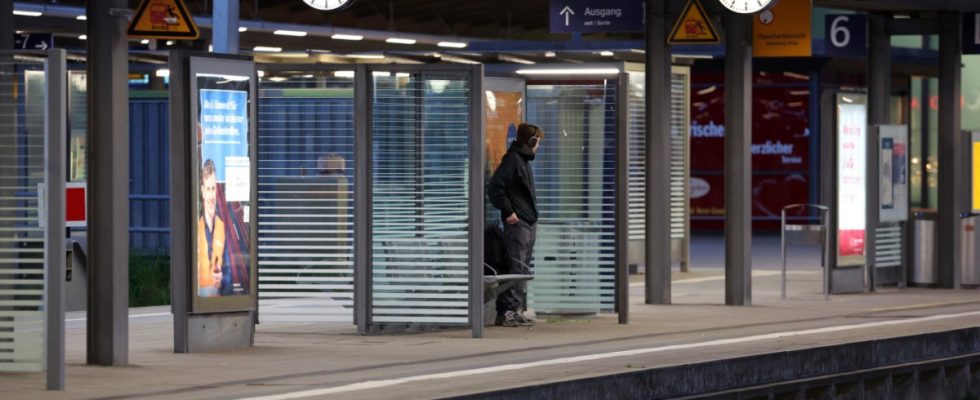The Germans experience new massive transport strikes. The railway union EVG announced that it would largely paralyze train traffic across the country for the second time this Friday in order to push through higher wages. The strikes are scheduled to begin at 3 a.m. and last until 11 a.m. “Not a single train will be running in this republic on Friday,” said EVG negotiator Cosima Ingenschay. From midday, the employees would do their utmost to ensure that travelers could then reach their destinations. All union members at Deutsche Bahn and in another 50 bus and train companies, where negotiations are currently taking place, have been called to industrial action.
Responsibility for the warning strikes lies with the employers who would not submit an adequate wage offer. Further train cancellations are already within reach. “We are ready to massively expand the strikes if we don’t get what we need,” announced Ingenschay. At the moment, strikes lasting several days are not considered proportionate. But that could change, depending on how the negotiations go. “If an employer refuses, we have to escalate at some point,” said negotiator Kristian Loroch.
Deutsche Bahn described the new EVG strike on Friday as a pure member acquisition campaign. “What’s the point? This strike is completely useless and unnecessary,” said HR director Martin Seiler. “On Friday, the day of the week with the most travel, it hits many commuters particularly hard. The EVG has completely lost its balance and is only relying on riots”.
Major failures are also to be expected at several airports from Wednesday night to Saturday night. The Verdi trade union announced that it would largely paralyze Hamburg, Düsseldorf and Cologne/Bonn airports with strikes by aviation security personnel. Longer waiting times, flight cancellations or cancellations are to be expected. Employees who work in passenger and goods control and in service areas will go on strike. The strike begins on Wednesday night and ends on Friday night. Verdi is negotiating to improve overtime pay and time premiums for night and weekend work. The railway union EVG stated that no joint action had been agreed with Verdi.
Before the new strike action on the trains was announced, the trade union and Deutsche Bahn had clashed hard. With 180,000 employees, most of the 230,000 employees for whom the EVG negotiates work there. The remaining employees work in mostly local transport companies. The railways already came up against the warning strike with which the EVG, together with Verdi, paralyzed local and long-distance traffic in the Federal Republic at the end of March – before a break in negotiations of several weeks.
The ideas of employee representatives and the railways are far apart. The union demands a twelve percent increase in wages for a year; but at least there should be 650 euros gross more per month. This would mean that employees who earn less would receive a disproportionate premium. The unions argue that these workers have suffered particularly badly from inflation. In this way, security or cleaning staff would receive a wage increase of more than 25 percent.
The railways, on the other hand, initially only offered an inflation premium of 2,500 euros and five percent more wages. However, the collective agreement for this should run for two years and three months. The union rejected this.
This week, Bahn Human Resources Director Martin Seiler suggested that the collective bargaining partners orientate themselves on the arbitration proposal for the public sector. According to this, the 2.5 million federal and local employees are to receive around six percent more for two years. Employers and public sector unions will negotiate the proposal over the weekend.
The negotiators of the EVG, however, outragedly refuse to orientate themselves towards the public service. Cosima Ingenschay and Kristian Loroch criticize, among other things, that the arbitration proposal contains an inflation premium that is not paid on a permanent basis. Loroch said on Wednesday: “First the railways came with nothing, then with too little. The railways could have made negotiable offers at any time. They did not use the Easter holidays.” To date, EVG has also rejected a long term.
Bahn personnel director Seiler, on the other hand, defends his proposal to orientate himself towards public service. “Why shouldn’t what is good for the 2.5 million public sector employees also be good for 180,000 railway workers? The EVG must finally face up to its responsibility for its employees now. A solution is possible, but it exists it only at the table.”
The next negotiations between the EVG and the railways will take place on April 25th. The union is under pressure several times in this collective bargaining round. On the one hand, due to the inflation rate of eight percent last year, the railway workers had significantly less salary at their disposal in real terms. Inflation is likely to be around six percent again this year. On the other hand, the EVG agreed to low wage agreements when the railway companies’ business collapsed in the corona pandemic and they accumulated high losses. For these concessions, the EVG was ridiculed by the train drivers’ union (GDL). Even during the crisis, the GDL pushed for high wage increases and is increasingly trying to recruit members in areas that the EVG has previously dominated.
Observers therefore assume that this time the EVG will only agree to a deal that is above what is currently being discussed in the public sector. At twelve percent, the first demand was already higher than the already offensive 10.5 percent that Verdi originally demanded for the public service. In the fall, GDL will also have new collective bargaining negotiations, so that this year the EVG will be in direct comparison with its competitors.

